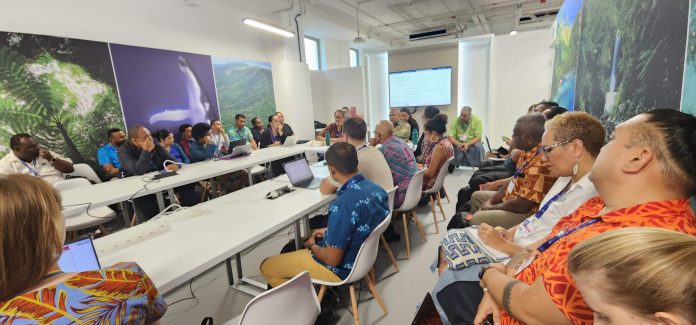Pacific nations including those bearing the brunt of the global climate crisis are coming to the COP 28 in UAE this week ready for “more action, more ambition and more urgency for an outcome that gets the world back on track,” says Pacific Islands Forum Secretary General, Henry Puna.
The 28th UNFCCC global climate negotiations are drawing record crowds and set to exceed 60,000-plus attendance records for the COP Presidency led by Forum and Pacific delegations, like many at this COP, are featuring increased numbers of youth voices to help amplify the Pacific urgency and future-facing focus for climate ambition, climate action and climate justice at the COP28.
This COP 28 will also see an increase in Pacific High Level Political champions heading to special sessions and side events, eager to ensure traction on a range of issues including the first global stock take on implementation of the Paris Agreement.
The eight Political Climate Champions of the Pacific are: Oceans and climate nexus – Fiji PM, Sitiveni Rabuka, Global Stock take – Cook Islands PM and Forum chair, Mark Brown, Climate Finance – Tonga PM, Huákavameiliku, Loss and Damage – Vanuatu Minister of Climate Change, Ralph Regenvanu, Just Transition – Tuvalu Minister of Finance and Climate Change, Seve Paeniu, Mitigation – Samoa Minister of Natural Resources and Environment, Toesulusulu Cedric Schuster, Adaptation – RMI Minister of Natural Resources and Commerce, John Silk, and Gender and Social Inclusion – Niue Minister of Natural Resources, Mona Ainu’u.
Thanking all current and former Pacific Islands Forum Leaders who have voluntarily taken on the additional duties of being political champions across key regional positions, SG Puna noted how high-level ownership of the climate crisis by Pacific Leaders and ministers has developed since five high level champions were announced in 2021. SG Puna also welcomed the Pacific Islands Forum Climate Youth Champion for 2023, Metoyer Lohia, of Papua New Guinea.
“Our young leaders of today are going to be leading the Pacific at 2050, so our approach today must take our youth from the spaces where decisions are being made, to where actions are being taken,” said SG Puna.
“Increasingly, and again in the 2050 Strategy for our Blue Pacific Continent, today’s Pacific Leaders have pointed to the existential threat of the climate emergency our world has found itself in. They agree that the only solutions which will address that existential threat are already tracked in the Paris Agreement. For our Pacific leaders, a return to the agreement outcomes must be global, urgent, and decisive. Our 2050 Implementation Plan endorsed by Forum Leaders in the days before coming to COP28, recognises that these substantive agreements must be followed by resourcing and action,” he said.
He pointed to the “ongoing search for innovation and ownership” which Pacific resilience is delivering on climate, noting the announcement by Saudi Arabia in recent weeks of a US$50m grant to support the new Pacific Resilience Facility as a Pacific-led response to disasters.
“COP28 is a complex global space where Pacific and other like-minded leaders must do all they can to scale up a rapid return to a 1.5-degree limit on global warming. Detailing how and when isn’t going to be easy. But it must be done, and it needs to be done now.” SG Puna said.
SOURCE: PIFS/PACNEWS














